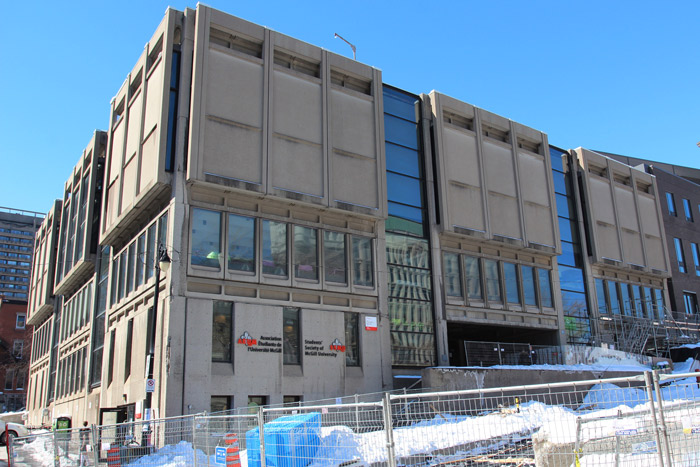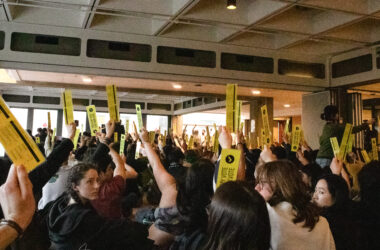On March 23, the Students’ Society of McGill University (SSMU) announced plans to hold an open forum on April 11 to discuss the creation and implementation of a SSMU Gendered and Sexualized Violence Policy (GSVP).
The creation of the GSVP was proposed after former SSMU vice-president (VP) External David Aird resigned following allegations of sexual assault and gendered violence. Aird stepped down on Feb. 22 following a statement released by the Community Disclosure Network (CDN) that claimed that Aird had performed acts of sexualized and gendered violence prior to and during his SSMU term. Additionally, a second SSMU executive, President Ben Ger, resigned on March 9 after allegations of gendered violence were brought against him.
The announcement also stated that current and future SSMU executives will now be trained on how to respond to disclosures of sexual violence. Additionally, SSMU opened an anonymous feedback form and will work with CDN on a long-term action plan for confronting sexualized violence within SSMU.
VP Student Life and Acting President Elaine Patterson admitted that the implementation of the university’s current Policy against Sexual Violence (SVP)–which was approved by Senate on Nov. 23–has been slow, but is nonetheless important.
“There are concerns about […] how long it is taking to implement [the SVP] and advertise it to students,” Patterson said. “[….We need a policy because] there are students who have been in positions of power who now have allegations against them of gendered and sexualized violence [….] A policy specifically tailored by SSMU and for SSMU is ideal in those scenarios.”
The CDN will advise SSMU during the development of the GSVP and at the open forum. On March 27, the CDN released a second statement emphasizing that the GSVP should be pro-survivor and easily accessible to students. In an interview with The McGill Tribune, a member of the CDN explained the organization’s role in creating the GSVP. The member requested to remain anonymous.
“SSMU is relying pretty heavily on [the] CDN […] because they just don’t have the structure to deal with [creating a policy],” the member said. “[….] The new ideas for protocol and what exactly needs to happen needs to come from the survivors in our community [rather than SSMU or admin].”
CDN will lead a number of initiatives in addition to its collaboration with SSMU, including three closed focus groups for survivors of sexualized violence to provide input on the SSMU GSVP. Beginning in April and continuing into next year, CDN will also organize roundtable discussions and workshops with student-led groups to address disclosures of sexualized violence.
“We’ll facilitate [training] on anti-oppressive policy-making, the frameworks of pro-survivor work, how to properly deal with disclosures, and some of the language around some of these things,” the member said.
According to Patterson, SSMU currently has no formal avenue for reporting and addressing sexualized and gendered violence. The CDN member explained that the only way to remove someone from the Executive Committee is through a General Assembly (GA). In order to avoid publicly identifying survivors at a GA, complainants’ only other option is to disclose to the SSMU Board of Directors (BoD).
In Fall 2016 two student groups, NDP McGill and McGill Against Austerity (MAA), became aware of allegations against Aird before SSMU, but were unable to remove Aird from office without identifying the survivors. In an email to The McGill Tribune, Cole Eisen, NDP McGill representative, wrote that the absence of a reporting mechanism that preserved survivor anonymity protected Aird’s tenure at SSMU.
“A clear, [survivor-oriented GSVP] coming from SSMU would benefit NDP McGill by providing our organization with a mechanism to remove offending members, respect the desire for anonymity on the part of individuals coming forward, and decouple holding positions of power within student organizations from the policy's implementation,” Eisen wrote. “NDP McGill seeks a clearly defined complaint mechanism, assurances those who hold positions of power in SSMU will not be above the policy, and a victim-first orientation that consults those affected at each decision-making juncture.”









